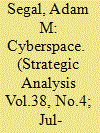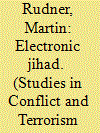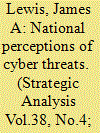| Srl | Item |
| 1 |
ID:
133607


|
|
|
|
|
| Publication |
2014.
|
| Summary/Abstract |
Cyber terrorism is a phenomenon that is gaining more and more attention. One reason for this is the concern that modern information and communications technology may be used in order to harm open societies. This concern also involves actual IT systems and the information generated being targets of advanced attacks. That way functions that are important to society could be affected. The term 'cyber terrorism' is complex. This article describes the difference between traditional and cyber terrorism. The main focus is on how the al-Qaeda terrorist network acts in cyberspace and how their change in concentration and activities has made them a clever player in an electronic Jihad.
|
|
|
|
|
|
|
|
|
|
|
|
|
|
|
|
| 2 |
ID:
133609


|
|
|
|
|
| Publication |
2014.
|
| Summary/Abstract |
In June 2013, President Obama met with President Xi Jinping at Sunnylands, California. The meeting was seen as a chance for the two leaders to get to know each other in a relatively informal setting so they could address the growing mistrust between their countries. While maritime disputes, trade tensions and differences over how to contain the North Korean and Iranian nuclear programmes were high on the agenda, cyber security-in particular Chinese cyber espionage-was the defining issue of this unusual summit. For the US, the meeting between the two presidents was the culmination of a long campaign to pressure Beijing to reduce the scope and scale of Chinese cyber attacks on the United States.
|
|
|
|
|
|
|
|
|
|
|
|
|
|
|
|
| 3 |
ID:
156145


|
|
|
|
|
| Summary/Abstract |
The Internet has emerged as a key technology for Al Qaeda and other jihadist movements waging their so-called electronic jihad across the Middle East and globally, with digital multiplier effects. This study will examine the evolving doctrine of “electronic jihad” and its impact on the radicalization of Muslims in Western diaspora communities The study describes Internet-based websites that served as online libraries and repositories for jihadist literature, as platforms for extremist preachers and as forums for radical discourse. Furthermore, the study will then detail how Internet connectivity has come to play a more direct operational role for jihadi terrorist-related purposes, most notably for inciting prospective cadres to action; for recruiting jihadist operatives and fighters; for providing virtual training in tactical methods and manufacture of explosives; for terrorism financing; and for actual planning and preparations for specific terror attacks. Whereas contemporary jihadist militants may be shifting from the World Wide Web to social media, such as Facebook, YouTube, and Twitter for messaging and communications, nevertheless the Internet-based electronic jihad remains a significant catalyst for promoting jihadist activism and for facilitating terrorist operations.
|
|
|
|
|
|
|
|
|
|
|
|
|
|
|
|
| 4 |
ID:
133608


|
|
|
|
|
| Publication |
2014.
|
| Summary/Abstract |
The issue of cybersecurity as an issue for international security has captured the attention of policy makers around the world. A 2011 United Nations (UN) assessment found that only 68 of the 193 UN member states had cybersecurity programmes. By 2012, this had increased to 114 countries. Of the nations with cybersecurity programmes, roughly 40 have publicly identified cybersecurity as a military concern in national military strategies or defence white papers.
|
|
|
|
|
|
|
|
|
|
|
|
|
|
|
|